Susan Johnson’s Greek odyssey with her 85-year-old mum: ‘I couldn’t have foreseen the drama’
Susan Johnson harboured the romantic notion that taking her elderly mum to live on a Greek island would strengthen their bond. She was wrong.
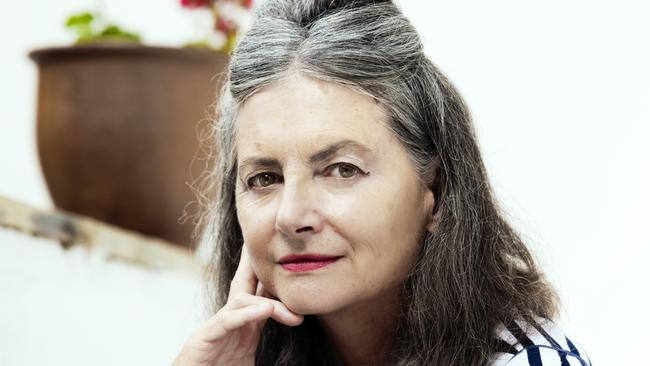
Within minutes of sitting down to lunch, novelist Susan Johnson is studying the menu with the sort of intensity, the gusto, that she has always applied to life. But gusto is the wrong word, given its Italian origins. Today it is all things Greek here at the Nostimo (Greek for yummy or delicious) restaurant on the balcony of Brisbane’s Greek Club. The city’s famous humidity is teasing the alfresco diners but the view across Musgrave Park and the cosmopolitan village that is West End to the city skyline is splendid.
No, gusto does not sit well. The closest Greek word to gusto is kefi (Susan will later explain: “The Greeks talk about your kefi, your spirit. Someone with kefi is full of zest.”) Greece, for her, is bursting with kefi. She started visiting the island of Kythera in her teens, once describing it as the place where she first started writing, and “began to unstitch myself from my past”. More recently she returned there for a year-long adventure with her then 85-year-old mother, Barbara. That odyssey became her brilliant, heart-wrenching new memoir Aphrodite’s Breath.
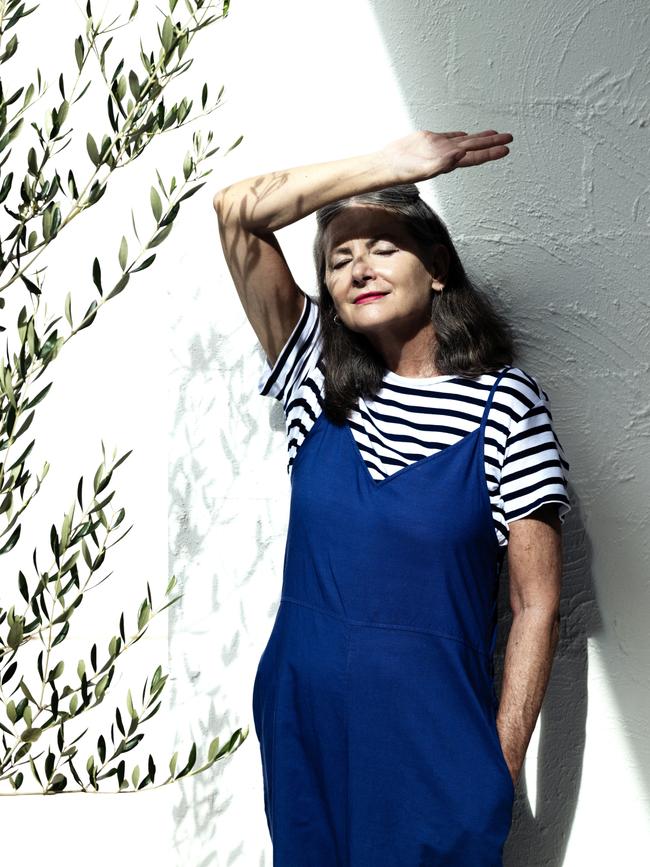
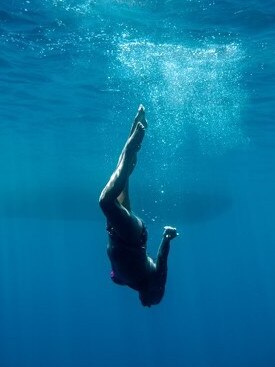
But we’re rushing ahead here. We’re taking the main course before the entrée. The lamb before the dips. Back to the menu in Susan’s hands. “I can now pretty easily recognise these words,” she says. “I mean, these are these English versions. But horiatiki is a small village salad, because horia comes from the word, like, capital place, and tiki means small… it’s a diminutive word. So I wouldn’t have known that before I went to Kythera. I mean, I would know words like arni, which is lamb. And psari tis imeras is fish of the day. I can read better than I can speak.”
“Fantastic.”
“Thalassina is the word for the sea, you know that don’t you?”
“No.”
“I think most people know that, no?”
“No.”
“OK,” she says.
This linguistic puzzle, it’s something so in keeping with Johnson’s unceasing curiosity. Or her “childlike wonder”, as her friends describe it. This genuine desire to get to the root of things, this need to open up the back of the grandfather clock of life and comprehend its workings.
“I’m very attentive and aware of other people’s experiences,” she says. “I’m very, very interested in other people. I do find the experience of life sometimes quite terrifying. But I think that’s what makes me a writer. You can’t have one without the other. I think there are very few writers who aren’t sensitive and possibly even exceptionally sensitive people, I would argue, don’t you think?”
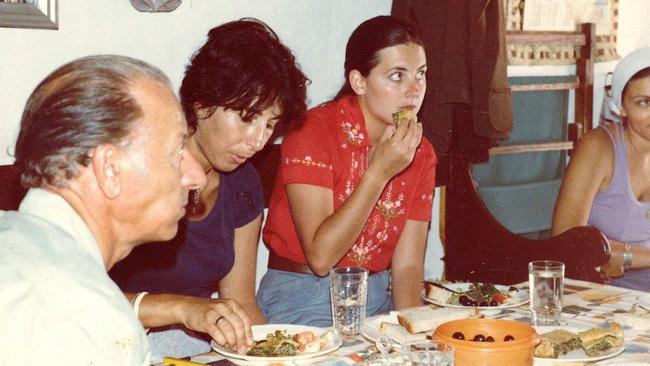
We order the modest luncheon banquet: taramasalata and fava bean dips with pita bread; thick haloumi chips; the horiatiki; the arni; and fries with feta. It is all here on the stage that is the Greek Club with its polished marble floors, monstrous pot plants, a portion of the ceiling a thick forest of worry beads, the flatscreen TVs advertising Pils Hellas beer, a Greek flag in neon lights, and beyond the balcony of the club, Brisbane, where Johnson worked as a cadet journalist for The Courier-Mail, and the city where she set her first novel, Messages from Chaos. She would go on to live around the world (Hong Kong, London, Paris), see off two marriages, have two much-loved sons (Caspar and Elliot), publish several highly acclaimed novels and memoirs, then return to where it all began, Brisbane, in her mid-fifties. She’s now 66. “I’ve gotten old,” she says out of nowhere. “It just happened.”
As the food arrives, plate by plate, she is unfailingly polite. She addresses the waiters with praise for the authenticity of the dishes. She eats like a sparrow. But there is a gentle restlessness about her, a minor electric current that might have just enough voltage to illuminate the blue-and-white neon flag at the far end of the restaurant. She is a self-confessed nomad, a person “built for slipping the net”. And there are intimations from her on this day – between the thick, rich rectangles of haloumi and the falling-off-the-bone lamb – that she may just may be on the move again. That she might be taking her kefi somewhere else.
You see this vivid and beautiful butterfly of a woman looking out towards the direction of the Brisbane River and just know that she’s not seeing that local, muddy serpentine of a watercourse, but perhaps in her mind’s eye the Ming blue waters off Kythera, the tiny island where the Ionian, Aegean and Cretan seas meet, the birthplace of Aphrodite, the goddess of love. You just know.
To get to the bottom of Susan Johnson’s kefi, you need to look no further than her father, the late John Johnson. He was a journalist for Brisbane’s Telegraph and between reporting stints he volunteered as a patrol officer in Papua New Guinea. It was while he was working on Sydney’s The Sun newspaper that he met his future wife, Barbara. Then he pivoted to business, becoming a senior executive with the 3M company (which makes Scotch tape, among other things), travelling regularly to Japan and the US. Susan was raised on Sydney’s northern beaches, but in her teens her father body-swerved again, this time buying a pineapple farm on the Sunshine Coast. He knew nothing about farming. Or pineapples. It’s just the sort of single-minded derring-do, the courage to dive into new experiences, that Susan would take and run with in her own life. (“I am far more temperamentally like my Dad. My high emotional pitch comes from him, not from Mum. Dad cried easily, and was easily moved by many things in life – as I am – but Mum was of a different emotional pitch entirely.”)
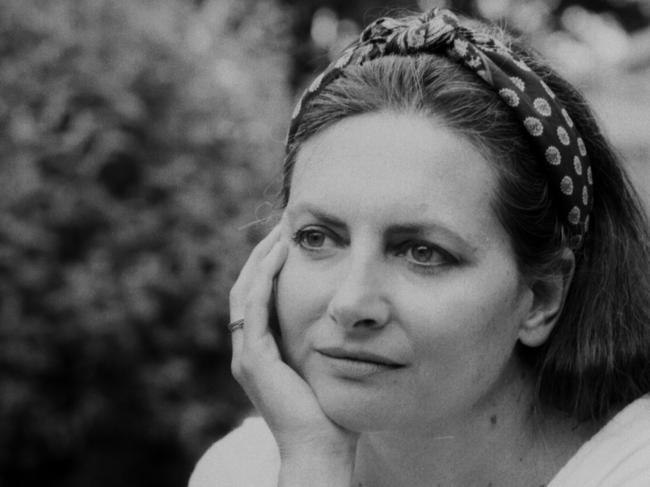
Dr Emma Felton, an adjunct researcher at the University of South Australia, who went to school with Susan on Sydney’s upper north shore, says: “I can think of a stand-out incident that perhaps illustrates her courage, I’d say, and her willingness to stand up for herself and for the right cause. We used to catch the bus to St Ives High co-educational school. It was a bit like Puberty Blues... the tough boys used to colonise the back seat of the bus, they’d all sit up there and they’d hurl abuse at people they didn’t like every now and then or, you know, who weren’t part of the echelon. Susan and I would sit further down front and just ignore them. But one day she went straight up the back and took them on. There was one boy who was a particular bully, and she just gave him a piece of her mind. And I said, ‘Oh my God, he’s going to whop her.’ But anyway, she put him in his place. And that stopped the kind of yelling out after that.”
Then John Johnson bought that pineapple farm, all those rolling acres of spines in the tropical north. “I thought it was really exciting, but I got the shock of my life,” Susan recalls. “I went to Nambour High, where we had to wear a little hat like an air hostess and salute the flag every morning. I didn’t know what hit me.”
Johnson would later go to school at Clayfield College in Brisbane and met a person who would change the direction of her life – fellow student Maria Comninos. “When I was at school my Greek parents were very conservative and so my social life was totally in the Greek community,” Maria recalls. “Then along came Susan. She was amazing. She was so cosmopolitan and sophisticated but in a down-to-earth way. Sophisticated in the sense that she had experienced things that we hadn’t experienced. She wasn’t judgmental; she had that childlike innocence. Susan was always special because she had that openness, but she also had a curiosity about other cultures and different things.”
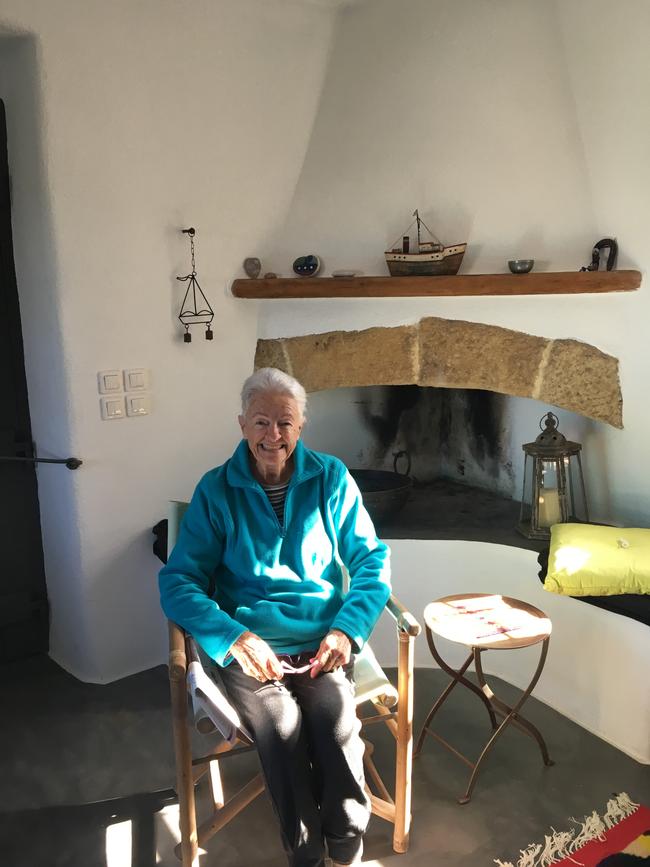
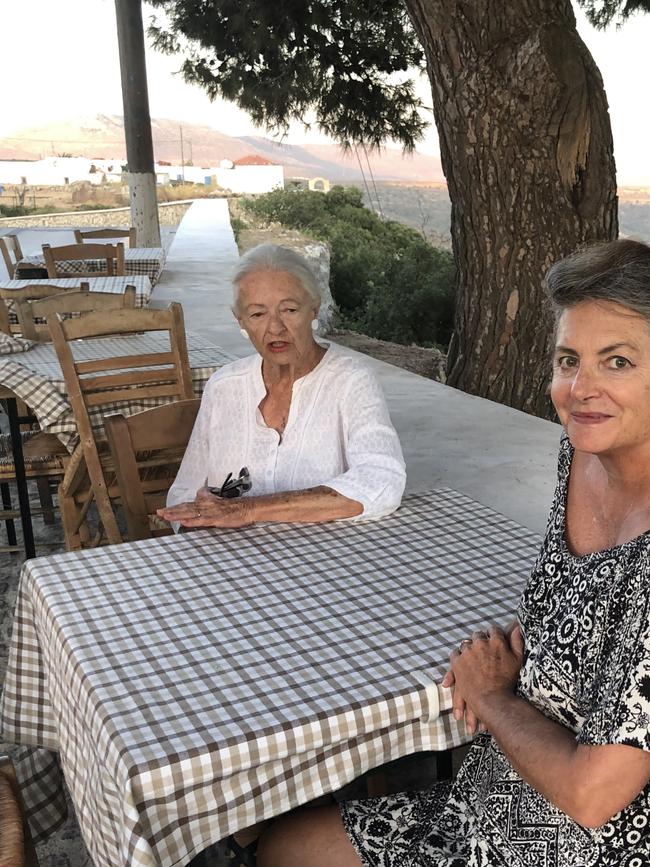
Susan became close friends with Maria’s family, then joined them on Kythera – where they had deep roots – in the mid-1970s. It was Susan’s first trip outside Australia. She writes in Aphrodite’s Breath: “I know I sat in their family home in Perlegianika during that bright year that set the course for the rest of my life – as a writer, as a perennial exile, as a person… I fell fatally and irrevocably in love with Kythera.”
Back in Brisbane after her brief Greek odyssey, Johnson joined The Courier-Mail as a cadet reporter. Writer and friend Sandra Hogan remembers meeting her fellow cadet. “We were sent out to cover this story about public toilets in Brisbane, what state they were in,” Sandra remembers. “I guess that was somebody’s idea of something amusing for cadets to do. Then we met in the Ladies’ Lounge of the Carlton Hotel in Queen Street – that was when women still weren’t allowed to drink in the same bar as the men – to discuss what we’d found so that we could write our stories.”
Sandra was struck by Susan’s looks. “She was just so beautiful, and you really can’t just not mention that about her because it was such a thing, you know, that I couldn’t stop looking at her. None of us could,” she says. “When we ordered drinks, she knew to order a lemon, lime and bitters, which I’d never heard of. And so my first impression of her was that she was a sort of cool, elegant figure who did things right; you know, ladylike. And then I discovered as I got to know her that she actually could be as wild as you wanted. She had a really big spirit and big dreams and a big, big heart. She’d go on any adventure. She was the boldest of all of us.”
-
“My writing is about wresting some sort of shape from chaos”
-
Susan rose quickly through the journalistic ranks, moving to Sydney to work on the Australian Women’s Weekly and later The Sydney Morning Herald. She was then appointed the Queensland correspondent for The National Times, a multi-Walkley award winning weekly newspaper that specialised in investigative journalism and feature writing.
As Sandra Hogan recalls, it was every journalist’s ambition in the 1970s and into the mid-1980s to work on The National Times. “She really had the world at her feet in terms of journalism. Then she stepped right out of it and just went off and wrote this novel.” That book was Messages from Chaos. It was well reviewed – the “voice of a generation” style of praise. (Disclaimer: I first became acquainted with Susan just prior to the publication of her novel, when she co-edited an anthology of Queensland short stories – Latitudes: New Writing from the North.) But Chaos triggered reviewer and reader assumptions that she had mined her own life for the book, which told the story of Anna Lawrence, a journalist working in Brisbane in the 1980s. Those assumptions – that she’s just a diarist – shadowed her career, novel after novel.
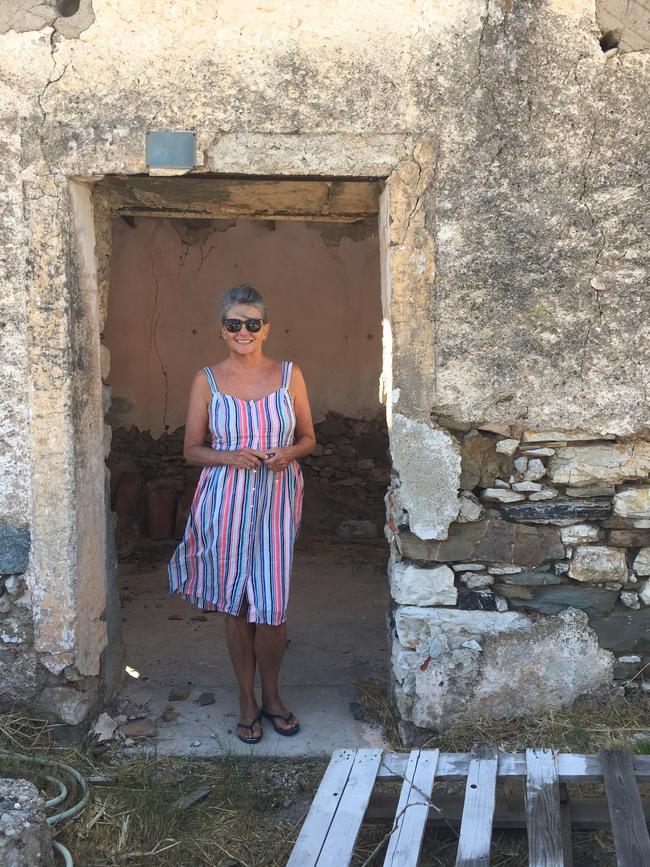
“If you put a story on the page as it happened, it just doesn’t work,” she says on reflection. “All experience has to be shaped into something meaningful, particularly for a book. It’s got to be given meaning because as we know in our lives, as we live them, they are full of chaos... You know, we only see meaning afterwards. I think that’s the thing that hurts, to be thought of as someone without much imagination. As just a transcriber.”
Author and photographer Tony Maniaty was in a relationship with Susan for a few years in the 1980s, “much of which was spent debating whether we should get married or not. We didn’t, but we’ve been close friends ever since.” He asks the question: how personal should writing get? “Like most authors, Sue mines her life experience for raw material, but she goes deeper and closer to the bone than most.”
In the late 1980s, Susan was living in Paris on a scholarship from the then Literature Board of the Australia Council, when she met lawyer John Burdett (who would later write the Bangkok 8 series of crime novels). They married on Crete and lived in Hong Kong, but the relationship was short-lived (she has called it her “starter marriage”). Meanwhile, other excellent novels soon followed her debut, with Flying Lessons and A Big Life published around the world, followed by Hungry Ghosts, and the memoir A Better Woman.
Johnson would go on to marry Australian-born journalist and musician Les Webb. They had known each other for years. The couple lived in Melbourne in the late 1990s and had sons Caspar (now 27) and Elliot (now 26) before moving to London. It was there that Johnson wrote The Broken Book, whose main character, novelist Katherine Elgin, was inspired by real-life writer Charmian Clift. Johnson believed she and Clift shared some characteristics. “I don’t have any superannuation... I could have stayed in journalism, bought a house in Sydney, done what everybody else did, but I didn’t. I really wanted to write so that’s what I did,” she said at the time.
In 2010, Susan returned from the UK with her sons to care for her ailing father, and settled back in Brisbane. After 16 years, her second marriage also ended. More wonderful novels continued to emerge – Life in Seven Mistakes, My Hundred Lovers, The Landing. Struggling to make ends meet, she briefly worked for the Queensland Government’s Department of Education before returning to newspapers.
“There I was, back in journalism, after years of scraping a living writing books. I was back where I began, on the very same Brisbane newspaper where I had started as a cadet reporter. My career goes bung indeed,” she later wrote of that moment. “I was the sole breadwinner. Then – as in much of life – events coalesced: at work there was talk of voluntary redundancies; next, my younger son declared his intention of going back to London where his father lives, closely followed by my elder son, who was about to graduate.” In 2019, she enacted another one of those classic Johnsonian pivots. She would quit her job. Quit her apartment. Quit Brisbane. And she would take her 85-year-old mother, Barbara, to live in Greece for a year. What could go wrong?
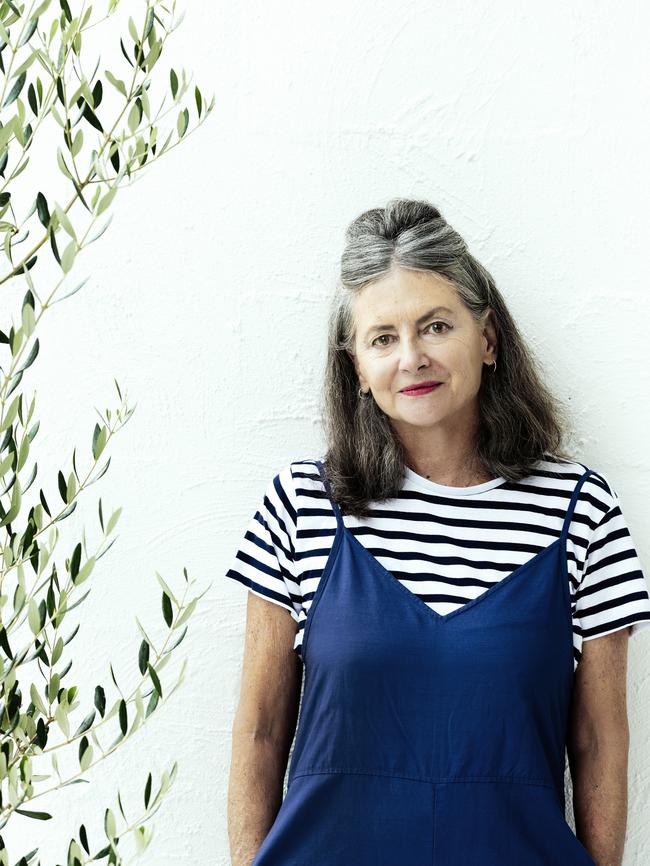
Susan explains the genesis of the idea to return to Kythera with Barbara in Aphrodite’s Breath. With the “responsibilities of hands-on mothering soon to fly from my shoulders”, she wanted to return to the island. But she couldn’t leave her elderly mother behind. “In a reckless moment I asked Mum if she might consider coming with me to live in Greece,” she wrote. “‘Why not?” her mother replied in a blink. “I’ll be close enough to heaven if my time is up.’”
It was a romantic notion. A mother and daughter spend precious time together on a Greek island. They fling off their old lives and are reborn. Susan herself writes that they were perhaps “brave and foolish in equal measure”. Her former newspaper colleagues (myself included) thought the idea of writing about this adventure was a winner, and that Susan might have an Under the Tuscan Sun-style hit on her hands. But life has a way of derailing the best-laid plans.
“The book I imagined was going to be this big, fat, happy party book, you know, like just having an absolutely fantastic time and getting to know the locals and maybe Mum would learn a bit of Greek,” she says. “Maybe she’d learn cooking. It was a completely different idea of what the experience was going to be.
“I was kind of shocked actually to find out how lacking in curiosity Mum was about another culture. She wasn’t into, like, seeing the olive harvest. There was a spanakopita class and she really wasn’t interested. So that was the main difference. I couldn’t have foreseen how she would have got her back up. And then I couldn’t have foreseen the drama of the ending.”
Sydney-based George Poulos, another Australian with deep family ties to Kythera, met Susan when she was on the island with Barbara. “To take an 85-year-old mother to the island isn’t courageous if she’s Greek,” George reflects. “But to take a very Anglo-Saxon mother, well… that’s really courageous. I think that was Susan’s way of connecting back to the island when she was 19 or 20, but also forging a better relationship with her mother. Because one of the things that comes out in the book is the mother-daughter relationship.”
Aphrodite’s Breath may not be the Greek island book that some people would expect, full of sunshine and donkeys and ouzo and grilled seafood by perfect beaches. What it is, though, is one of the finest renditions of a late-life relationship between a parent and child. It has moments of great joy, it brims with kefi, it is told with an enormous affection for Kythera and its people, and it can be uplifting and uproariously funny. Very little escapes Susan’s eye, from human folly to landscapes to the shift of seasons. As Barbara fails to graft to her new surroundings, and the mother-daughter Greek experiment begins to teeter, Susan, with heartbreaking sensitivity, chronicles her mum’s difficulties, her confusions, her mood swings, her fears.They learn new things about each other. They learn fresh insights about themselves. Susan wonders what has brought them to this place – rugged, windy, haunted – where they each face some inescapable and deep-seated truths.
How do you turn an idea like the happy Greek memoir into art when the whole project gets hijacked by the unforgiving grittiness of life? “When I read the book I was reminded of how beautifully she captures every scene, the telling details and the big sweep,” says Tony Maniaty. “That’s all her years in journalism, of course, getting it absolutely right. Nothing she’s done before displays such a degree of what I’d call ‘literary courage’ as Aphrodite’s Breath. The tensions and revelations between mother and daughter, often painful, are delivered with unflinching honesty, and framed by a portrayal of Greece that’s equally without illusions.
“We share a love of Greece. Mine is ancestral, but Sue’s is driven by the Aegean spirit, which is tempered by her understanding of the Greeks themselves. They’re a complex people, with one foot in the traditional past and the other in a troubled present. They can be difficult and happy at once, and Sue captures these contradictions in the book in a way that I think few non-Greek writers have before.”
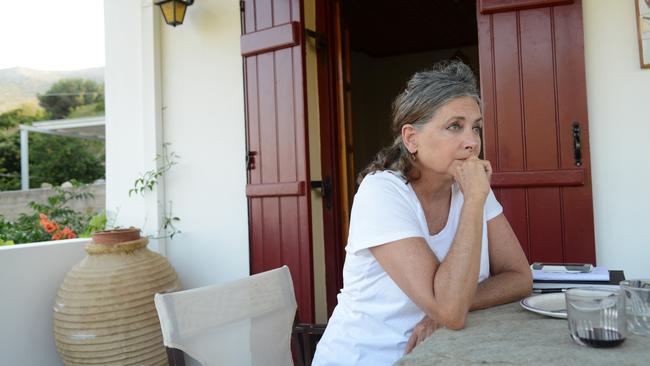
George Poulos agrees. “She’s absolutely captured the essence of the island,” he says. “Kytherians have got a good alarm system for fakes. And she is not a fake. She’s the real deal. And her love for the island is very clear. It’s right there in front of you.”
For years Susan Johnson has been one of our finest writers. Few working today can match her technical competency, nor her unique ability to render matters of the heart with such brutal beauty. There are surprises at the end of Aphrodite’s Breath that will profoundly move you. This is ultimately a book about life and all its complexities. It’s a subject Johnson has never shied from. She has stared it down and reported back to the rest of us.
Her first novel had the word “chaos” in its title. And it is chaos that is her specialty. “You know, if I had to say what my writing life is about, it is about wresting some sort of shape from chaos,” she says. “If I had to define it, it would be about wresting some meaning or shape from the chaos of experience... You know, we pretend that we’ve got control over it, but we don’t. And so what writing gives us, I would argue, is some notion of control. Because we can control the narrative, and we feel we don’t have any control over the narrative in our actual lives. I’ve had quite a chaotic life. I mean, I’ve lived in a lot of different places. I know a million people. But my writing has been my anchorage.”
We leave Nostimo but before we go, Johnson compliments the maitre’d on the restaurant and the club, renovated a few years ago. In the street outside, we make our farewells. She is heading over to New Farm, across the CBD in the city’s inner-east. She doesn’t need a lift.
“No, no, no, I’ll get the bus,” she says. “There’s one that goes straight to New Farm. Easy.”
And she ambles to the bus stop, this slight woman who has lived a big life, her hair streaked with grey, her eyes sharp, watching everything, and her soul filled with kefi. So much kefi.
Aphrodite’s Breath by Susan Johnson (Allen & Unwin, $34.99), out April 4


To join the conversation, please log in. Don't have an account? Register
Join the conversation, you are commenting as Logout